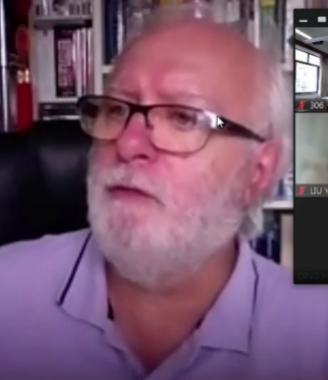To celebrate the 70th anniversary of the founding of the China University of Political Science and Law (CUPL), to pass on the vibrant culture and spirit of CUPL, and to highlight the characteristics of training international legal talents, the China-EU School of Law (CESL) launched the ‘CESL Featured Courses Series’, an introduction to some featured courses from CESL.
After establishing a framework of Public International Law and the development of International Organizations, the module “Public International Law & Human Rights” moves on to the following courses on "human rights". "International Dimension of Human Rights" is the third course in this module. It was taught by Prof. Syméon Karagiannis, a professor of public law at the University of Strasbourg, France. At the China-EU School of Law, he has taught the “International Dimension of Human Rights” course since 2008.
Before the "European Human Rights Law" course, it is necessary to understand the development of human rights in the international dimension. "International Dimension of Human Rights" aims to help students have a general idea of the United Nations system for the protection of human rights, and regional systems for the protection of human rights outside Europe, such as the Inter-American system and the African one.
Due to COVID-19, this course flexibly adopted a combination Recorded Lectures + Live Q&A. Students from the China-EU School of Law have sufficient time to study recorded lectures in advance. Prof. Karagiannis divided the course into 17-unit videos, which are mainly composed of four parts:

Prof. Karagiannis taughted at CESL in September 2013
Part Ⅰ is the preliminary thoughts of human rights, involving the philosophic thinking about human rights, the legal foundations, and the proposal and development of the concept of human rights under the influence of the 18th century French revolution and World War II. Prof. Karagiannis explains the historical evolution of human rights. He points out that the early development of human rights is just a national issue, and then gradually rises to the international level. At the beginning, only some International League Covenants mentioned the protection of human rights at the international level.
Part Ⅱ is the beginning of human rights in the field of international law, especially the legal nature of the Universal Declaration of Human Rights and the place of human rights in the United Nations Charter. Prof. Karagiannis explained that the Universal Declaration of Human Rights is not an international treaty, so it is not binding. However, the Universal Declaration of Human Rights is of great significance to the development of human rights at the international level. It not only stipulates the principles of human rights, but also introduces specific rights and "human's duty". Although the United Nations adopted the Universal Declaration of Human Rights in 1948, it was also opposed by some countries, which reflects the difficulties to develop human rights consensus at the international level. To develop human rights at the international level, different cultural and political factors must be reconciled. Therefore, the main issue of human rights is how to design a binding international treaty within the framework of the United Nations, not limited to national protection.
Part Ⅲ is human rights in international treaties. Because of political reasons, the United Nations cannot provide different categories and types of human rights in a single treaty. Therefore, the principles of the Universal Declaration of Human Rights have been transposed into two international treaties by the United Nations: International Covenant on Civil and Political Rights (ICCPR) and International Covenant on Economic, Social and Cultural Rights (ICESCR).
In this part, Prof. Karagiannis explained a lot about the specific provisions contained in the two conventions. For example, in ICCPR, he introduces the right to life, anti-discrimination, derogation and so on. And also analyzes the role of the "quasi-judicial body" of the Human Rights Committee.
Part Ⅳ introduces other international human rights treaties, which are United Nations treaties other than the 1966 Covenants, and treaties on the protection of human rights in times of war. The former mainly involves the measures taken to promote human rights development proposed by the United Nations, and the human rights achievements outside European regional systems, mainly in African and Inter-American systems. The latter analyzes the provisions on the protection of human rights in times of war in the Hague Convention and the Geneva Convention, and their shortcomings, such as lacking provisions for new types of warfare. Therefore, two additional protocols to the Geneva Convention are further introduced.
After students self-study through the recorded lecture, Prof. Karagiannis answered questions online. Prof. Karagiannis not only answered the students' questions, such as the legal effect of the Universal Declaration of Human Rights, but he also focused on further conclusions to be drawn from the course and elaborated the context to help students better understand the broad ideas being taught.

Prof. Karagiannis answers question online
Although face-to-face teaching cannot be realized this year, both the law school and professor attach great importance to enhance student learning. Prof. Karagiannis not only provided a written replies to the questions after the live lectures, but also pointed out improvements for the students' performance on the examination, to help students constructively reflect upon their study methods.
Welcoming the 70th Anniversary of CUPL: CESL Featured Courses Series
Welcoming the 70th anniversary of CUPL: Showcasing CESL course on "The European Union: from its origins to Brexit"
Welcoming the 70th anniversary of CUPL: Showcasing CESL course on "International Business Law"
Welcoming the 70th Anniversary of CUPL: Showcasing CESL course on "Legal Research and Writing"
Welcoming the 70th Anniversary of CUPL: Showcasing CESL course on "Legal Foundations of Public International Law"
Written by: WANG Yuelian, CESL double master from 2020 intake
